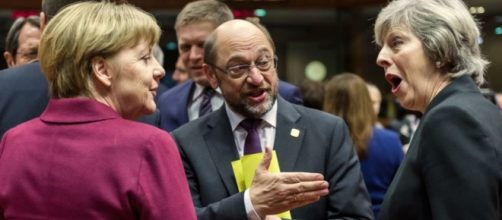Prior to Article 50 being triggered, it made sense to many that Britain should negotiate with the EU as a collective body. This is because under the provisions of the 2007 Lisbon Treaty, if the Prime Minister issued Article 50 after March, she would have had to discuss Brexit with the 27 member states as opposed to one chief negotiator who represents the entire trading bloc. It was feared that each country would issue different demands and destroy Brexit.
He clearly does not represent the best interests of German car manufacturers
Reflecting upon the talks so far, it has not benefitted the UK to negotiate with Michel Barnier.
He clearly does not represent the best interests of German car manufacturers, French winemakers or Belgian chocolate makers who want to retain access to British markets. The EU's survival, ironically, depends on a satisfactory trade deal with Britain. Without it, Brussels is increasingly vulnerable to other events slowly unfolding like the Italian banking crisis, the rise of Euroscepticism and volatile Eurozone growth. In hindsight, it was a mistake to trigger Article 50 before March 31st.
What Brussels forgets is that, even though all individual members have sacrificed their negotiating powers to Mr. Barnier, once the final deal has been decided, they still vote on it. Theresa May should ignore the EU's complaints about British politicians touring European capitals; she ultimately needs their votes to ensure Brexit becomes a reality.
They do not intend to let their countries suffer due to Mr. Barnier's stubbornness
Apart from President Macron and Chancellor Merkel, to a certain extent, the majority of EU leaders do not want to see these discussions collapse. Irish Taoiseach Leo Varadkar welcomes Mrs May's Irish border proposals. The Danish Foreign Minister said Britain's position reflects that of the trading bloc's. Eastern European leaders, particularly in Hungary and Poland, are becoming so frustrated with Brussels' behaviour that they do not intend to let Brexit spark further tensions. These are all influential countries in the EU, and the British Government is right to consult them before the next round of talks concludes.
It is apparent they do not intend to let their countries suffer due to Mr. Barnier's stubbornness.
No country has ever left the EU. There are no constitutional conventions that can guide the Government on this process. Greenland exited the European Economic Community in 1985 before it evolved into the complicated body the EU is today. David Cameron made no contingency plans before June 23rd last year. All parties began these talks with blind eyes. It has been a learning curve for all sides. Yet if Mr. Barnier does not think about the European businesses dependent on the UK for trade, Mrs May will be forced to walk away before the Brexit Department can even prepare for a "no deal" scenario and work the rest out for themselves.

